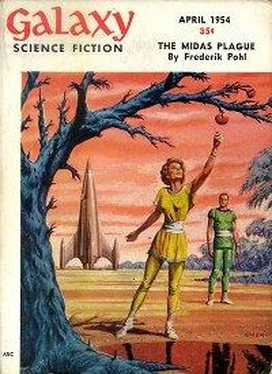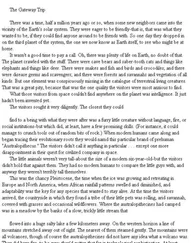Pohl Frederik - The Midas Plague
Здесь есть возможность читать онлайн «Pohl Frederik - The Midas Plague» весь текст электронной книги совершенно бесплатно (целиком полную версию без сокращений). В некоторых случаях можно слушать аудио, скачать через торрент в формате fb2 и присутствует краткое содержание. Год выпуска: 1954, Издательство: Galaxy Publishing Corporation, Жанр: Фантастика и фэнтези, на английском языке. Описание произведения, (предисловие) а так же отзывы посетителей доступны на портале библиотеки ЛибКат.
- Название:The Midas Plague
- Автор:
- Издательство:Galaxy Publishing Corporation
- Жанр:
- Год:1954
- ISBN:нет данных
- Рейтинг книги:5 / 5. Голосов: 1
-
Избранное:Добавить в избранное
- Отзывы:
-
Ваша оценка:
- 100
- 1
- 2
- 3
- 4
- 5
The Midas Plague: краткое содержание, описание и аннотация
Предлагаем к чтению аннотацию, описание, краткое содержание или предисловие (зависит от того, что написал сам автор книги «The Midas Plague»). Если вы не нашли необходимую информацию о книге — напишите в комментариях, мы постараемся отыскать её.
The Midas Plague — читать онлайн бесплатно полную книгу (весь текст) целиком
Ниже представлен текст книги, разбитый по страницам. Система сохранения места последней прочитанной страницы, позволяет с удобством читать онлайн бесплатно книгу «The Midas Plague», без необходимости каждый раз заново искать на чём Вы остановились. Поставьте закладку, и сможете в любой момент перейти на страницу, на которой закончили чтение.
Интервал:
Закладка:
“Sorry,” said Newman at last, wiping his eyes, “but I couldn’t help it. Penalties! Well, Mr. Fry, let me set your mind at rest. I wouldn’t worry about the penalties if I were you. As soon as the reports began coming through on what you had done with your robots, we naturally assigned a special team to keep observing you, and we forwarded a report to the national headquarters. We made certain—ah—recommendations in it and—well, to make a long story short, the answers came back yesterday.
“Mr. Fry, the National Ration Board is delighted to know of your contribution toward improving our distribution problem. Pending a further study, a tentative program has been adopted for setting up consuming-robot units all over the country based on your scheme. Penalties? Mr. Fry, you’re a hero!”
A hero has responsibilities. Morey’s were quickly made clear to him. He was allowed time for a brief reassuring visit to Cherry, a triumphal tour of his old office, and then he was rushed off to Washington to be quizzed. He found the National Ration Board in a frenzy of work.
“The most important job we’ve ever done,” one of the high officers told him. “I wouldn’t be surprised if it’s the last one we ever have! Yes, sir, we’re trying to put ourselves out of business for good and we don’t want a single thing to go wrong.”
“Anything I can do to help—” Morey began diffidently.
“You’ve done fine, Mr. Fry. Gave us just the push we’ve been needing. It was there all the time for us to see, but we were too close to the forest to see the trees, if you get what I mean. Look, I’m not much on rhetoric and this is the biggest step mankind has taken in centuries and I can’t put it into words. Let me show you what we’ve been doing.”
He and a delegation of other officials of the Ration Board and men whose names Morey had repeatedly seen in the newspapers took Morey on an inspection tour of the entire plant.
“It’s a closed cycle, you see,” he was told, as they looked over a chamber of industriously plodding consumer-robots working off a shipment of shoes. “Nothing is permanently lost. If you want a car, you get one of the newest and best. If not, your car gets driven by a robot until it’s ready to be turned in and a new one gets built for next year. We don’t lose the metals—they can be salvaged. All we lose is a little power and labor. And the Sun and the atom give us all the power we need, and the robots give us more labor than we can use. Same thing applies, of course, to all products.”
“But what’s in it for the robots?” Morey asked.
“I beg your pardon?” one of the biggest men in the country said uncomprehendingly.
Morey had a difficult moment. His analysis had conditioned him against waste and this decidedly was sheer destruction of goods, no matter how scientific the jargon might be.
“If the consumer is just using up things for the sake of using them up,” he said doggedly, realizing the danger he was inviting, “we could use wear-and-tear machines instead of robots. After all why waste them?”
They looked at each other worriedly.
“But that’s what you were doing,” one pointed out with a faint note of threat.
“Oh, no!” Morey quickly objected. “I built in satisfaction circuits —my training in design, you know. Adjustable circuits, of course.”
“Satisfaction circuits?” he was asked. “Adjustable?”
“Well, sure. If the robot gets no satisfaction out of using up things—”
“Don’t talk nonsense,” growled the Ration Board official. “Robots aren’t human. How do you make them feel satisfaction? And adjustable satisfaction at that!”
Morey explained. It was a highly technical explanation, involving the use of great sheets of paper and elaborate diagrams. But there were trained men in the group and they became even more excited than before.
“Beautiful!” one cried in scientific rapture. “Why, it takes care of every possible moral, legal and psychological argument!”
“What does?” the Ration Board official demanded. “How?”
“You tell him, Mr. Fry.”
Morey tried and couldn’t. But he could show how his principle operated. The Ration Board lab was turned over to him, complete with more assistants than he knew how to give orders to, and they built satisfaction circuits for a squad of robots working in a hat factory.
Then Morey gave his demonstration. The robots manufactured hats of all sorts. He adjusted the circuits at the end of the day and the robots began trying on the hats, squabbling over them, each coming away triumphantly with a huge and diverse selection. Their metallic features were incapable of showing pride or pleasure, but both were evident in the way they wore their hats, their fierce possessiveness… and their faster, neater, more intensive, more dedicated work to produce a still greater quantity of hats… which they also were allowed to own.
“You see?” an engineer exclaimed delightedly. “They can be adjusted to want hats, to wear them lovingly, to wear the hats to pieces. And not just for the sake of wearing them out—the hats are an incentive for them!”
“But how can we go on producing just hats and more hats?” the Ration Board man asked puzzledly. “Civilization does not live by hats alone.”
“That,” said Morey modestly, “is the beauty of it. Look.”
He set the adjustment of the satisfaction circuit as porter robots brought in skids of gloves. The hat-manufacturing robots fought over the gloves with the same mechanical passion as they had for hats.
“And that can apply to anything we—or the robots—produce,”
Morey added. “Everything from pins to yachts. But the point is that they get satisfaction from possession, and the craving can be regulated according to the glut in various industries, and the robots show their appreciation by working harder.” He hesitated. “That’s what I did for my servant-robots. It’s a feedback, you see. Satisfaction leads to more work—and better work—and that means more goods, which they can be made to want, which means incentive to work, and so on, all around.”
“Closed cycle,” whispered the Ration Board man in awe. “A real closed cycle this time!”
And so the inexorable laws of supply and demand were irrevocably repealed. No longer was mankind hampered by inadequate supply or drowned by overproduction. What mankind needed was there. What the race did not require passed into the insatiable—and adjustable-robot maw. Nothing was wasted.
For a pipeline has two ends.
Morey was thanked, complimented, rewarded, given a ticker-tape parade through the city, and put on a plane back home. By that time, the Ration Board had liquidated itself.
Cherry met him at the airport. They jabbered excitedly at each other all the way to the house.
In their own living room, they finished the kiss they had greeted each other with. At last Cherry broke away, laughing.
Morey said, “Did I tell you I’m through with Bradmoor? From now on I work for the Board as civilian consultant. And,” he added impressively, “starting right away, I’m a Class Eight!”
“My!” gasped Cherry, so worshipfully that Morey felt a twinge of conscience.
He said honestly, “Of course, if what they were saying in Washington is so, the classes aren’t going to mean much pretty soon. Still, it’s quite an honor.”
“It certainly is,” Cherry said staunchly. “Why, Dad’s only a Class Eight himself and he’s been a judge for I don’t know how many years.”
Morey pursed his lips. “We can’t all be fortunate,” he said generously. “Of course, the classes still will count for something— that is, a Class One will have so much to consume in a year, a Class Two will have a little less, and so on. But each person in each class will have robot help, you see, to do the actual consuming. The way it’s going to be, special facsimile robots will—”
Читать дальшеИнтервал:
Закладка:
Похожие книги на «The Midas Plague»
Представляем Вашему вниманию похожие книги на «The Midas Plague» списком для выбора. Мы отобрали схожую по названию и смыслу литературу в надежде предоставить читателям больше вариантов отыскать новые, интересные, ещё непрочитанные произведения.
Обсуждение, отзывы о книге «The Midas Plague» и просто собственные мнения читателей. Оставьте ваши комментарии, напишите, что Вы думаете о произведении, его смысле или главных героях. Укажите что конкретно понравилось, а что нет, и почему Вы так считаете.












